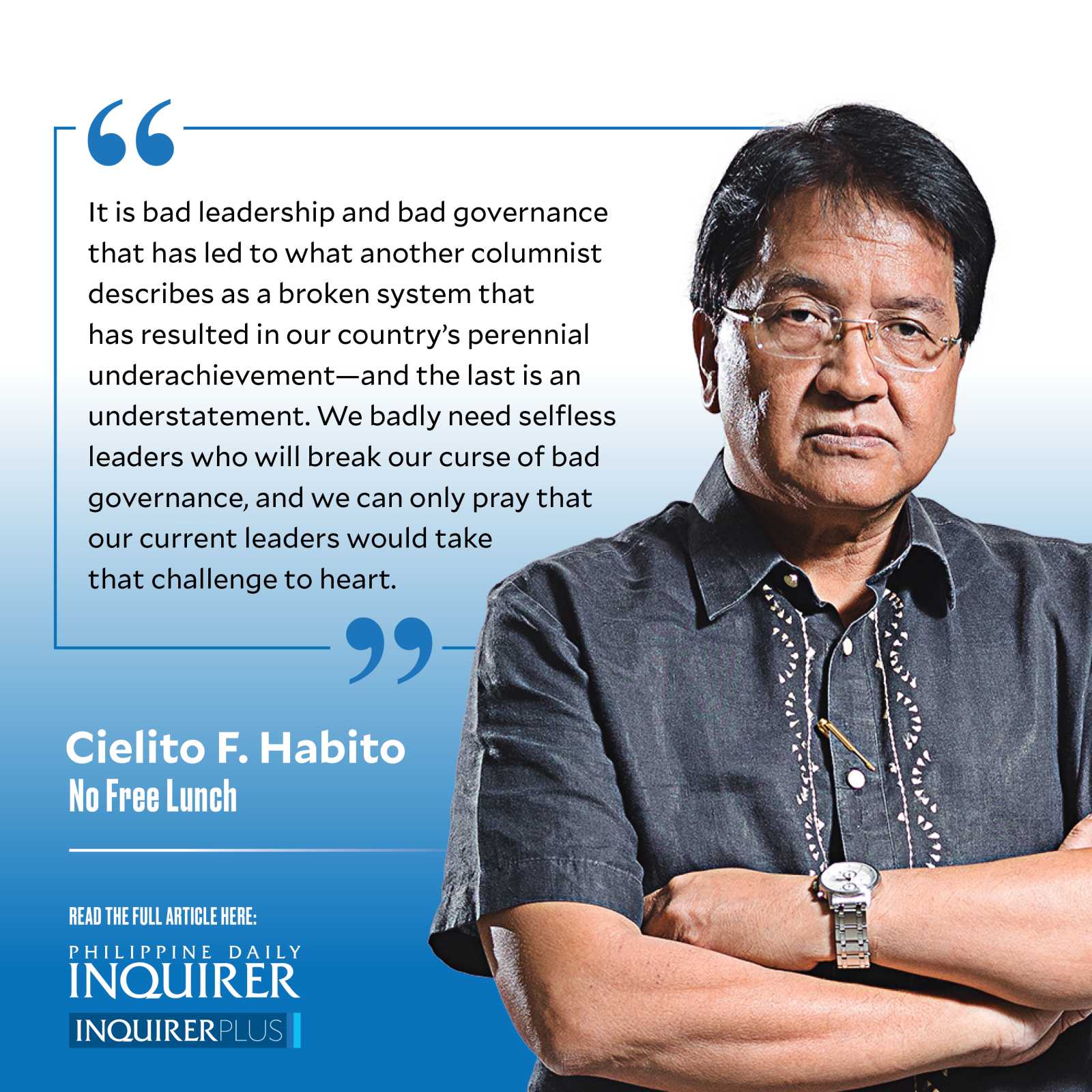The curse of bad governance
I’m far from alone in believing that bad governance has been our biggest block to keeping in step with our more progressive neighbors and peers who once upon a time looked up to us but have now left us far behind. Let me single out five faces of the bad governance I speak of (I’m sure readers can easily cite more): (1) self-serving leaders and decision-makers, (2) nonenforcement of laws and policies, (3) overcentralized decision-making, (4) sadistic government processes and requirements, and (5) regulatory capture. I didn’t bother to separately list graft and corruption, which could well be our worst enemy, as I see little need to elaborate on what it does to us, whether individually or to our whole economy and society.
Every person elected or appointed to public office motivated by other than a genuine desire to serve and help lift the country up from decades of backwardness, poverty, and inequality represents a drag on our country’s progress. Unfortunately, it’s hard not to feel that the well-meaning ones are the minority and that we’re largely at the mercy of people out to gain and perpetuate their wealth and power. Why we keep electing the wrong kinds of leaders is something we must come to grips with.
Article continues after this advertisementPoor execution and enforcement of policies and laws lower overall business confidence and our general attractiveness to job-creating investments. Where those who break the rules are the ones who get ahead, even the obedient are led to follow suit—and the rule of law breaks down.
Overcentralized decision-making is a problem I’ve always encountered in visits to our rural areas over many years. I usually ask common folk what they would ask if they had one wish that government could grant—and what they are actually getting. Invariably, government misses out on their greatest need, as the tendency for “one-size-fits-all” approaches conceived at the national level leads to ill-designed interventions that are unresponsive to actual problems on the ground. There’s a propensity for approaches that involve large-scale centralized procurement (of fertilizers, seeds, medicines, etc.), never mind that these may not necessarily be what’s needed out where the problems are—and we all know why.
Unnecessarily cumbersome procedures and documentary requirements, often redundant and bordering on sadistic, face anyone needing something from the government, be it a clearance, permit, license, registration, or other documents. I’ve written time and again about the seemingly pervasive mindset among government bureaucrats to throw as many hurdles as they could in the way of ordinary citizens. It’s especially true for those wanting to set up a business. The unduly high cost of time, effort, and money needed to open, start up, and maintain an enterprise dampens, rather than encourages job creation via entrepreneurship. Little wonder that the unemployment rate in the country is consistently the highest among our peers—even with millions of Filipinos already employed overseas—as our government makes it unnecessarily more difficult to create jobs.
Article continues after this advertisementWhere regulated monopolistic or oligopolistic firms actually are the ones in control of their regulators, this facilitates and strengthens monopolistic forces in our economy, thereby fostering higher costs in key industries. This in turn raises costs in downstream economic activities, harming their competitiveness and that of the economy as a whole.
Some three decades ago, I presided over the formulation of an ambitious national development plan that had all the ingredients to bring our country prominently back into the world map. With then President Fidel V. Ramos at the helm, we made positive moves in that direction. But it’s often said that our plans have always been good, but we are miserable failures in execution. It is bad leadership and bad governance that has led to what another columnist describes as a broken system that has resulted in our country’s perennial underachievement—and the last is an understatement. We badly need selfless leaders who will break our curse of bad governance, and we can only pray that our current leaders would take that challenge to heart.
—————-
cielito.habito@gmail.com

















